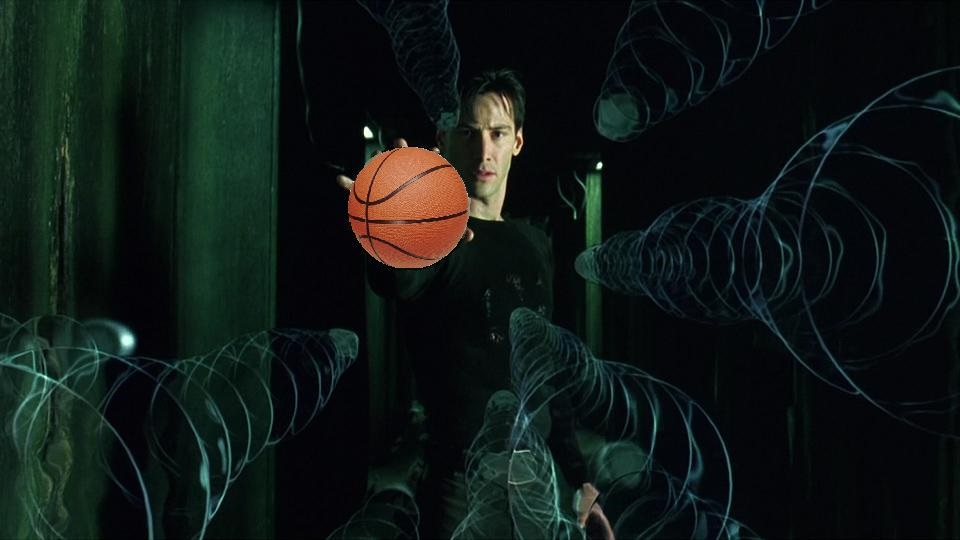Today’s technology makes consuming short fiction easier than ever. E-readers, laptops, tablets, probably your phone – you can stay current by plopping down pretty much anywhere and opening your receivers wide to the nearest airborne WiFis.
Technology is changing the way we consume other forms of entertainment as well. That’s the premise for “Meshed,” this week’s spotlight speculative short by Rich Larson. It shows us a near-futuristic sports industry, where paying customers can not only watch someone play, they can experience the player’s bodily sensations as if they were the player. Vic, our talent scout POV character, must sign up a promising young basketball player, and through his eyes we see the sticky moral areas of a world that has taken technology to surprising extremes.
WARNING: Do not attempt to proceed without first consulting the story. If symptoms of Spoileriasis persist, please contact a medical professional.

The Setting
In “Meshed,” technology has led to new heights of voyeuristic fanboyism. Forget ordering classic games off ESPN or even GoPros for that matter, which offer only a glimpse of the kind of up close and personal experience fans crave. Mesh is more invasive, like you’d imagine brain surgery would be. Think of it like the Matrix for basketball fans. When hooked up lets the viewer hear the roar of the crowds, feel the slamming of the dunks, and other things sports fans like. Sports aren’t really my forte; if you want sports descriptors done right, read this column instead.
I think the real world sports setting of “Meshed” keeps us grounded. It makes it easier to believe that, yeah, mesh could totally be a Thing in the near future. I mean, we’re pretty into augmented reality already; enhancing our experiences to include other senses is what’s pushing that particular envelope. Yet we can’t go melding the worlds of the Real and the Unreal without considering the costs and challenges. I mean, we all know how out of hand we can get when we translate our imaginations into technology.

“Your scientists were so preoccupied with whether or not they could that they didn’t stop to think if they should.”
Again, take a moment to really appreciate the sports setting. (I’m not the only one this month.) Larson could have given us more space battles with mesh technology; instead we get what feels like a reflection of what’s currently feasible and available to us. It feels like a natural evolution, with mesh technology having gotten its controversial start as a military application, ensuring soldiers obeyed orders at any cost, then winding its way into the hands of consumers as something to turn a profit. It’s the kind of careful worldbuilding that considers every angle, and how technology can be used and abused.
The Characters
Considering our world’s flourishing entertainment industries, it isn’t hard to imagine a fictional world with the same sports star hero-worshipping we have, where cutthroat companies are prepared to shell out a lot of dough for the procurement of new, up-and-coming talent. Vic, the POV character in “Meshed,” provides the perfect set of eyes to see this world. He’s up for a promotion at Nike, and he needs seventeen-year-old hoopster Oxford Diallo on board with the mesh contract to get it. While he comes across as a skeezy marketing guy, Vic isn’t quite rubbing his hands in glee. He’s definitely on that spectrum though. And despite that, you can’t help but admire his perseverance. He tantalizes Oxford with promises of fame and glory every step of the way, even pitting the boy against his own father. You can’t exactly blame Vic; he’s got personal stakes in the deal. Even characters in speculative fiction stories can feel pressured by their bosses.
It’s rewarding for us to see a POV character who’s largely oblivious to his own scumminess. Oh, Vic’s not completely soulless; he’s manipulative, sure, but that’s just business. We do get several moments where his decency shines through the murk that clouds his marketer’s moral compass, but he doesn’t act on these feelings. His own wants are too powerful, too at odds with how opposed to mesh the Diallos are. It’s the fictional equivalent of watching a train wreck; it’s terrible and fascinating all at the same time. We want to tell him he’s blowing his chance at signing Oxford, getting promoted, and asking his girlfriend to move in with him – but we can’t. And that makes the story all the more entertaining to read.
Maybe you’ve heard about choosing a viewpoint character by who is in the most pain. That’s what David Farland often says, and I’m not one to argue completely. But Larson’s decision to have the villain as the POV character of “Meshed” is an incredibly interesting choice from the audience perspective. Vic views – no, causes other characters to hurt each other while pushing forward with his own agenda anyway. The result is a story that’s a real treat to read.
Vic does more than villainize. He represents one of two ideals Oxford Diallo must choose from. He stands for fame and fortune and modernity, while Diallo Sr. represents a traditional upbringing of principles, family loyalties, and the scars of the past. Oxford knows he can’t choose both (he promised his grandfather, who fought in a war where mesh made its terrible debut) – but who knows how long ago that was? Long enough that the dazzling world Vic shows him is enough to make the poor boy reconsider.
Oxford wants to be the tech-enhanced basketball star that Vic promises he’ll be, but he also wants to honor his promise not to get meshed. Oxford is just a kid, talented yet impressionable, and his indecision drives the plot – just as it drives a wedge between him and his father.
The Plot
From the story’s very beginning, the plot moves us toward answering this question: Who isn’t going to get what they want? The tug-of-war between Vic and Oxford’s dad, fame vs. family, lasts for the story’s entirety. Vic is constantly manipulating the flow of the game, pushing Oxford further and further until suddenly we’re reading about a conflict between Diallo vs. Diallo rather than Diallo vs. Nike. The tension reaches a boiling point in the fourth quarter story’s climax with some father-son action on the b-ball court, where Oxford dunks all over his sickly dad before he realizes he’s being a real shit. They make up while Vic watches helplessly on, the chance at signing Oxford slipping through his fingers.
This moment, with all three characters in pain (one of whom in the very physical sense), lasts only a few paragraphs – but it’s enough. In many short stories, the characters exist in our viewfinders only as long as it takes to see how their immediate actions play out. “Meshed” is a picture-perfect example of a story that gets us in late, gets us out early, and leaves us with the damage still fresh in our minds. When Vic’s moral principles shine their brightest, he continues to hold them back – again, he can’t voice them; he has his professional career to maintain. But his failure to do so isn’t a letdown because it feels so cathartic.
The Takeaway
Technology is changing the way we live and experience things. Deep stuff, I know; really let that simmer in your brain-soup for a second. But we need to temper that with the idea that technology is all but being forced upon us. The interactions between the characters in Larson’s “Meshed” are good reminders that technology may seem like an essential part of our future, but maybe, just maybe, we don’t need to buy into it. Not all of it, anyway. Because if the choice comes between embracing everything technology has to offer and the freedom to make that choice, maybe we’re better off walking away.
I mean, we have the choice to not have a Facebook, right? There’s still room for hanging onto your principles.







